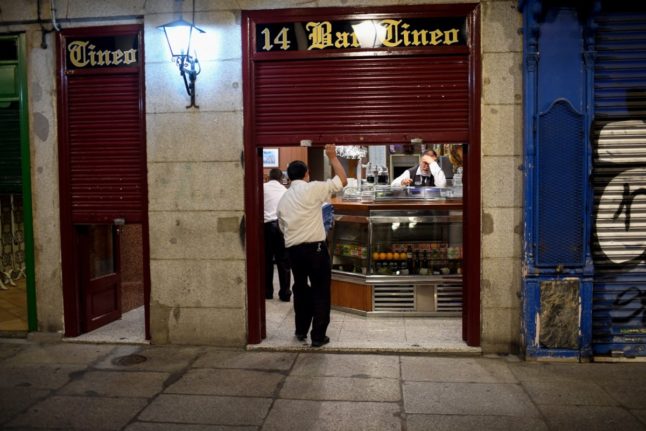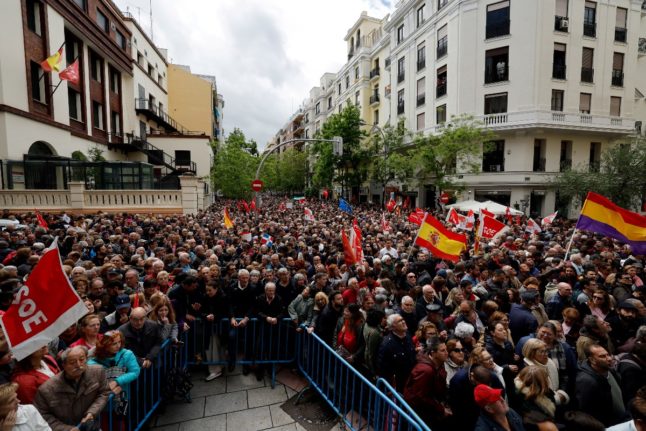Spain’s Minister of Labour and Social Economy, Yolanda Díaz, has outraged sections of the Spanish hospitality sector and her political opponents by claiming that restaurants staying open beyond midnight in Spain is “madness”.
The comments contradict long-held cultural norms in Spain about going out and eating late at night.
In Spain, eating lunch at 2pm or 3pm and then having dinner at 9pm or 10pm, meaning you might stay out until beyond midnight, is extremely common, especially at weekends.
READ ALSO: The Spanish cultural quirks you only notice once you live in Spain
Speaking at a Sumar parliamentary group meeting in Congress on Monday, Díaz claimed that “it is unreasonable for a country to have its restaurants still open at one o’clock in the morning,” comparing the Spanish culture of late-night nightlife to other European countries, where she claims restaurants close earlier.
“The difference with the rest of Europe is crazy,” the hard-left politician said.
“We can’t expect to keep extending the timetables until we don’t know what time.”
Díaz, who is also a second Deputy Prime Minister, made the comments during wider discussion of Spain’s working week, and forms part of broader reforms her ministry are implementing to cut down on working hours and improve work-life balance and overall productivity in Spain.
In January the Ministry announced it would cut the average working week to 37.5 hours from 40 by 2025.
The policy will see a progressive drop in weekly work hours of 1.5 hours in 2024 (to 38.5 hours) and of 2.5 hours in 2025.
READ ALSO: Spain set to slash work week to 37.5 hours
The reduction in working hours, Díaz says, can help to “structure” Spanish society, but for it to be effective she suggests Spain must reconsider some of its long-held timekeeping quirks and somewhat unique cultural timetables.
Díaz considers late-night restaurants unreasonable and contrary to this long-term aim. As Labour Minister, Díaz also has concerns about working conditions for hospitality professionals who work long, unsociable hours.
The Minister also claimed that her department has met with major employers’ associations from the tourism and hospitality sectors to highlight Spain’s differences with the rest of Europe.
However, Díaz’s comments on restaurants closing late have not gone down well with the sector. The employers’ association España de Noche responded that “it makes no sense” to focus on the nightlife, tourism and hospitality industries “without taking a sociological and in-depth approach to the timetables in Spanish society.”
READ ALSO: 17 ways your eating and drinking habits change when you live in Spain
“The [nightlife] offer and activity is one of the pillars of Spain being the first country in the world in holiday tourism, so any experiment endangers our lifestyle model, our tourist attractiveness and the activity of companies in the sector,” the association said.
Díaz’s comments also provoked a reaction from the populist right-wing regional president of Madrid, Isabel Ayuso, a leader who won a large majority in the regional election on the back of reopening bars and restaurants in Madrid during the Covid-19 pandemic.
“We are different. Spain has the best nightlife in the world, with streets full of life and freedom. And that also provides employment. They want us to be puritanical, materialistic, socialist, soulless, without light and without restaurants because they feel like it. Bored and at home,” Ayuso said on her Twitter/X account.
Díaz has since responded to Ayuso’s comments by saying she shouldn’t treat the subject so lightly and that working late into the night can result in mental health risks.
Es que somos diferentes.
España tiene la mejor vida nocturna del mundo, con las calles llenas de vida y libertad. Y eso también da empleo.
Nos quieren puritanos, materialistas, socialistas, sin alma, sin luz y sin restaurantes porque les da la gana.
Aburridos y en casa. https://t.co/z6jq0R9yRM
— Isabel Díaz Ayuso (@IdiazAyuso) March 4, 2024



 Please whitelist us to continue reading.
Please whitelist us to continue reading.
Member comments